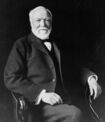Organization:Carnegie Mellon CyLab
The Carnegie Mellon CyLab Security and Privacy Institute is a computer security research center at Carnegie Mellon University.[1][2] Founded in 2003 as a university-wide research center, it involves more than 50 faculty and 100 graduate students from different departments and schools within the university.[3] It is "one of the largest university-based cyber security research and education centers in the U.S."[4]
CyLab works with the CERT Coordination Center as well as US-CERT on matters relating to cybersecurity.[5] The institute is often cited for its security and privacy research.[6][7][8][9][10]
picoCTF
picoCTF is a cybersecurity capture the flag competition hosted by CyLab. Established in 2013, the event is run annually over a period of two weeks and is geared towards high schoolers, billing itself as the largest high school cybersecurity event in the United States; the inaugural edition had 6,000 participants and 39,000 people competed in 2019.[11] The challenges, which are modeled around real-life cybersecurity problems, are themed around a different storyline each year.[12] The program aims to get high schoolers interested in computer security, offering cash prizes.[13]
External links
References
- ↑ "Cylab at Carnegie Mellon University". US-CERT, U.S. Department of Homeland Security. https://buildsecurityin.us-cert.gov/resources/websites/cylab-at-carnegie-mellon-university. Retrieved August 5, 2016.
- ↑ Lindquist, Christopher (15 January 2004). "Security Supergroup: Carnegie Mellon's CyLab combines experts into an information security powerhouse". CIO: The Resource for Information Executives (CXO Media, Inc.). https://books.google.com/books?id=qQoAAAAAMBAJ&dq=carnegie+mellon+cylab&pg=PA94. Retrieved August 5, 2016.
- ↑ "CyLab - Cybersecurity Capacity Portal". The University of Oxford. https://www.sbs.ox.ac.uk/cybersecurity-capacity/content/cylab. Retrieved August 5, 2016.
- ↑ "About CyLab". Carnegie Mellon Cylab. https://www.cylab.cmu.edu/about/index.html. Retrieved August 5, 2016.
- ↑ "Carnegie Mellon CyLab Overview". Carnegie Mellon University College of Engineering. http://engineering.cmu.edu/research/centers/cylab.html. Retrieved August 5, 2016.
- ↑ Chirgwin, Richard (May 24, 2016). "Want a better password? Pretend you eat kale. We won't tell anyone". The Register. https://www.theregister.co.uk/2016/05/24/want_a_better_password_pretend_you_eat_kale_we_wont_tell_anyone/. Retrieved August 5, 2016.
- ↑ Weisman, Steve (September 12, 2015). "Is your child already a victim of identity theft?". USA Today. https://www.usatoday.com/story/money/personalfinance/2015/09/11/children-victims-identity-theft/72091926/. Retrieved August 5, 2016.
- ↑ "McAfee and Carnegie Mellon Report Finds Serious Disconnect Between Businesses and Mobile Users". McAfee, Intel Security. May 24, 2011. http://www.mcafee.com/us/about/news/2011/q2/20110523-01.aspx. Retrieved August 5, 2016.
- ↑ Hill, Kashmir (December 17, 2015). "The university that broke the Dark Web is still running Tor nodes—but it's not what it appears". Fusion. http://fusion.net/story/242267/carnegie-mellon-tor-nodes/. Retrieved August 5, 2016.
- ↑ "New Research Reveals Cyber Risk Still Not Getting Adequate Attention from Boards and Senior Executives". EMC Corporation. February 27, 2012. http://www.emc.com/about/news/press/2012/20120227-02.htm. Retrieved August 5, 2016.
- ↑ Doughty, Nate (March 15, 2022). "Carnegie Mellon University's high school cybersecurity hacking competition picoCTF begins". PIttsburgh Inno (American City Business Journals). https://www.bizjournals.com/pittsburgh/inno/stories/profiles/2022/03/15/cmu-cybersecurity-hackathon-picoctf-begins.html.
- ↑ "Carnegie Mellon University to launch picoCTF cybersecurity event next week". Security. March 12, 2021. https://www.securitymagazine.com/articles/94810-carnegie-mellon-university-to-launch-picoctf-cybersecurity-event-next-week.
- ↑ Sostek, Anya (April 9, 2017). "Wanted: hackers. Reward: the best may get a spot at CMU". Pittsburgh Post-Gazette. https://www.post-gazette.com/news/education/2017/04/09/hacking-carnegie-mellon-cmu-pico-ctf-ppp-david-brumley-DefCon-Capture-the-Flag/stories/201704090092.
 |

